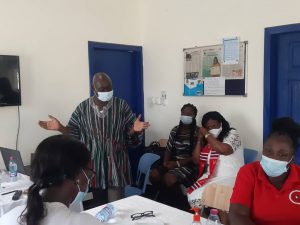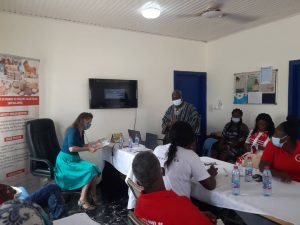The Food and Agricultural Organization (FAO) has undertaken a half day sensitization training for members of the Apex body of Women in Poultry Value Chain (WIPVaC) as part of activities to create and intensify awareness of the avian influenza among players in the poultry industry.
The training organized by the FAO’s Emergency Centre for Transboundary Animal Disease (ECTAD) was aimed at improving the poultry farmers understanding of some practices and activities than can contribute to the spread of the Avian influenza on farms. ECTAD is FAO's corporate centre for the planning and delivery of veterinary assistance to FAO member countries as a response to threats of transboundary animal health crises.
Dr. Anthony Akunzule, facilitating the training, stressed that most of the farms that recorded the avian influenza did not observe standards. He described the farm house at Nungua in the Greater Accra region that was reported to have first recorded the virus this year was “improper”. The farm had guinea fowls, quails and rabbits. “It was not properly constructed and had other animals too”
[caption id="attachment_8607" align="alignnone" width="300"] Dr. Anthony Akunzule, facilitating the training[/caption]
Dr. Anthony Akunzule, facilitating the training[/caption]Another affected farm at Teshie, also within Greater Accra, had an aviary attached to the fence of the poultry farm. The farm also had some sides of the fence wall covered with tall tree which provided shelter to migratory birds.
The affected farm at Budumbura, allowed a street food seller to store cooking utensils at the close of business and had no biosecurity measures installed,” he narrated.
He therefore cautioned the members of WIPVaC to adhere to strict practices on their farms to avoid the spread of the virus
The psychological trauma of losing your birds alone can disrupt your life and no amount of compensation would be enough” he told WIPVaC members.
Although the impact of the flu at the moment was significant only on the individual farms and their employees, he said a further spread of the outbreak could have dire economic consequences for the industry, for jobs, and the entire Ghanaian economy.

The impact on the industry will increase when people are not well informed and educated, and they start avoiding chicken and eggs. Once they do that, there is going to be a loss to the industry as eggs and birds could pile up and go bad," he stressed.
And with that, he said, "People will lose investments, and for people who took bank loans to stock their farms, the interests may pile up, and they would find it difficult to fulfill their parts of the obligation to their creditors."
Read also: WIPVaC donates eggs to Pantang Hospital
[caption id="attachment_8603" align="alignnone" width="300"] Members of the Apex body of Women in Poultry Value Chain[/caption]
Members of the Apex body of Women in Poultry Value Chain[/caption]He encouraged Ghanaians to continue patronizing poultry products since all the affected birds had been destroyed, suggesting that people should boil their chicken and eggs well before eating.
But farmers are resilient, so we shall ride it out despite the challenges that are besetting us. We will ride it out, but we need the cooperation of everybody," he added.

The members of WIPVaC in expressing their appreciation for the training noted that the outbreak of avian influenza compounded the plight of Ghanaian poultry sector. They believe the flu outbreak coupled with the existing challenge of shortage and high cost of feed constitutes double jeopardy to the industry.
We are worried and concerned, particularly about the way the flu could spread, so it is critical that with the help of government and other agencies, we stem the spread of the disease immediately," the members stressed.
The first HPAI H5N1 outbreak was reported in April 2007 in a small – scale poultry farm at Kakasunanka, near Michel Camp in the Tema Metropolis. Regions affected at the time were the Greater, Volta and Brong Ahafo. The recent virus was recorded in July 2021, and has so far affected three regions namely Greater, Volta, Central, Ashanti.

According to statistics from the Veterinary Services Directorate of the Ministry of Food and Agriculture (MOFA), about seven farms reported the avian flu outbreak from the Greater Accra, Volta, and Central Regions. And more than 10,000 poultry birds had been lost to the outbreak in Ghana this time.

Comments